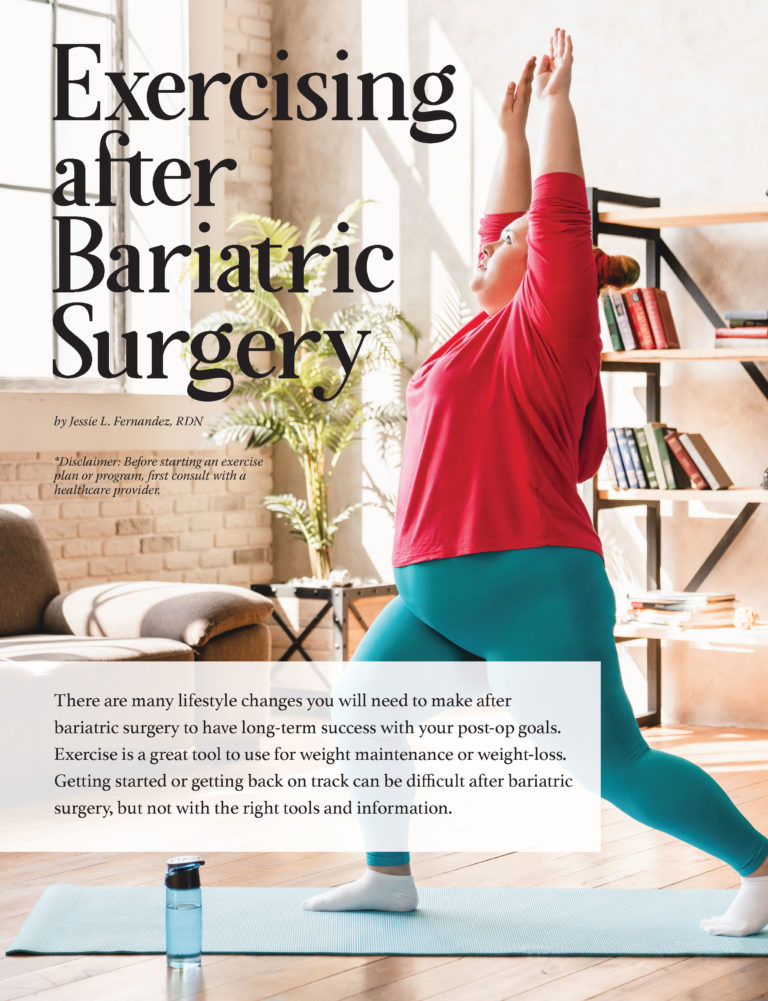Exercising after Bariatric Surgery


by Jessie L. Fernandez, RDN
*Disclaimer: Before starting an exercise plan or program, first consult with a healthcare provider.
There are many lifestyle changes you will need to make after bariatric surgery to have long-term success with your post-op goals. Exercise is a great tool to use for weight maintenance or weight-loss. Getting started or getting back on track can be difficult after bariatric surgery, but not with the right tools and information.
When Should I Begin Exercise after Bariatric Surgery?
Most patients can start an exercise regimen between two weeks and six weeks after surgery, but it’s important to get clearance from your bariatric surgeon before starting a moderate to vigorous program.
When you return home from the hospital, start by walking 20-30 minutes each day. You will need to start at a slow pace and build up your stamina and strength by taking three 5-10 minute walks throughout the day instead of doing it all at once.
After you are fully healed and get cleared by your surgeon, you will need to increase the intensity of your routine and add in the three main pillars of exercise:
- Cardio Activity
- Strength Training
- Flexibility Training
Cardiovascular Activity
Cardiovascular activity, or aerobic activity, is any type of exercise that increases your heart rate. Cardio helps improve the muscles in your heart, relieve pain and stiffness in your joints, manage high blood pressure and diabetes, and improve your mood through the release of endorphins, or “happy hormones.” Getting regular cardio activity can also help you burn more calories throughout the day and sleep better at night.
If you are starting exercise after bariatric surgery, you will want to start slowly to build your stamina while preventing injuries. Try starting off with a 5-10-minute session in the morning and another 5-10-minute session in the evening. Once you feel comfortable, gradually start adding a few minutes to each session until you work your way up to 30-minute sessions at a time.
There are many types of activities which can improve your cardiovascular fitness, including:
- Walking
- Jogging
- Hiking
- Kickboxing
- Zumba
- Rowing
- Cycling
- Swimming
The most important part of starting cardiovascular activity after bariatric surgery is making sure that you are modifying exercises based on your body and fitness needs.
Strength Training
Once you reach the 3-month post-op mark, you should have started incorporating a strength training regimen. Strength training – also known as resistance or weight training – involves improving muscular fitness by using external resistance such as free weights, resistance bands, weight machines, and even your own body weight. Unfortunately, most people don’t devote enough time to developing a strengthening routine. However, after bariatric surgery, this will be vital to your success for many reasons.
It is important to focus on the TYPE of weight you are losing and not just the overall amount of weight. You will need to track your body composition to ensure you are losing body fat mass while maintaining muscle mass. This is because muscle is more metabolically active than fat – or in simple terms, muscle burns more calories throughout the day, even when you are at rest. Maintaining and building muscle will also help support your bones and connective tissue, benefitting you by preventing injuries. Additionally, it can aid in building bone density, which becomes incredibly important after bariatric surgery and with increasing age.
When you get started with resistance training, there are two terms you will want to become familiar with: the words “rep” and “set” and the differences between them.
- A rep, or repetition, is a single occurrence of one exercise (a bicep curl, for example).
- A set is a certain number of repetitions of that exercise performed successively (10 bicep curls performed one after another is one set, for instance).
If you are a beginner, you will want to start with a simple program that works all muscle groups (back, biceps, triceps, chest, abs, glutes, hamstrings, quads and calves) two days per week.
For the first few sessions, you should focus on learning how to do each exercise with proper form rather than focusing on the amount of weight you are working with. Having good form will prevent injuries and allow you to have a more effective workout. Be sure to stand tall with your chest lifted, shoulders back, and abs held tight during each movement. Try not to swing your arms or legs to ensure that you are engaging the muscle and not using momentum.
Once you become more familiar with the movements of each exercise, you will then need to focus on choosing the right weight. Choose a weight that challenges you, but one that you can control with proper form through the full range of motion for the entire set. If you are coming out of bariatric surgery, be sure to use a comfortable weight or even no weight at all until your surgeon or healthcare provider recommends otherwise.
Flexibility Training
Flexibility training – or stretching – will give your body a wider range of motion which will help improve your strength training regimen as well as everyday activities like bending down to pick something up. It can also help you avoid discomfort when you are confined to a small space for a long period of time, such as sitting at a desk all day or taking a long car ride.
You don’t need to stretch every single day to reap the benefits. Start off with some stretching exercises 2-3 days per week. You will find that you can stretch further without pain or tightness after your muscles are warm, so try doing a light walk or jog beforehand.
When you engage in stretching exercises, make sure your movements are slow and smooth. Avoid bouncing or jerking and try to hold each stretch in a comfortable position for 30 seconds. If that is too difficult, start off with 10 seconds and try to increase the time as it becomes easier. Be sure to breathe normally while you are stretching and always keep joints slightly bent to avoid injury.
You can increase your flexibility by just simply doing some light stretching exercises at the end of your cardio or strengthening workout, or you can try a more thorough program like yoga or Pilates which are great for any fitness level!
Exercise Recommendations
Two to three months after surgery, you should talk to your healthcare provider about meeting the daily recommended amount of physical activity. Everyone’s body is different and you should always proceed with caution before taking on new or more difficult exercise.
Most guidelines suggest that adults should get about 150 minutes of moderate-intensity aerobic activity each week. In addition to aerobic activity, you should aim to participate in muscle-strengthening activities two or more days per week. As mentioned, participating in regular flexibility training exercises 2-3 days a week will help round out your aerobic and strengthening programs.
Once you have participated in an aerobic and strengthening program for 4-6 weeks, your body will adapt to the exercises and it may not be as challenging, which means it’s time to switch it up. You can modify weights, repetitions, or change exercises altogether. Any changes that keep the body guessing will help you prevent weight plateaus and notice improvements throughout your fitness journey.
Bariatric surgery can be a great tool to help you manage your weight and improve your quality of life. However, it still comes with hard work and requires a commitment to healthy diet, behavior and lifestyle changes in order to be successful. You will be more likely to commit to an active lifestyle if you love the type of exercise you’re doing, so don’t be afraid to try new things, grab a workout partner, and make it fun!
Examples of Moderate-intensity Aerobic Activities:
- Brisk walking
- Riding a bike
- Going for a jog
- Water aerobics
- Rollerblading
- Hiking
Examples of Muscle-strenthening Activities:
- Lifting weights
- Working with
- resistance bands
- Climbing stairs
- Cycling
- Push-ups
- Squats
About the Author:
Jessie L. Fernandez, RDN, is the bariatric coordinator for the RESET Center in Corpus Christi, TX and has specialized in the field of bariatric surgery since 2007. She has had the privilege of helping thousands of bariatric patients reset their weight, restore their health, and feel their best for a lifetime.
by Yelena Kibasova Spring 2024 The fitness world is evolving, with new trends and innovations that promise…
Read Articleby Zack Lucks, NASM-CPT, EMT Winter 2024 Working out with a loved one is a great way…
Read Articleby Nina Crowley, PhD, RD (with Inspiration from Shawn Cochran) Winter 2024 Dating, no matter your age,…
Read Article








